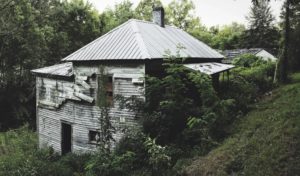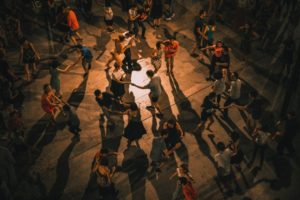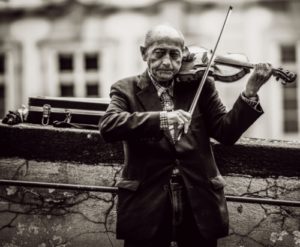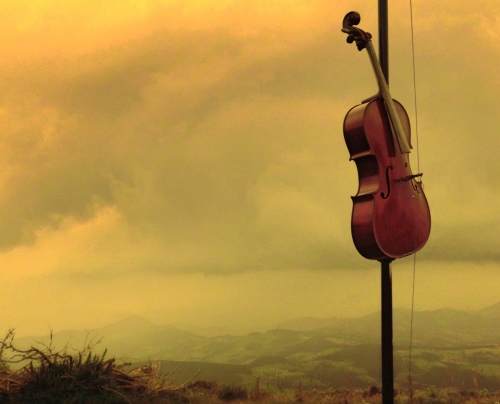The Dancing Fiddle was going to close down. It had stood at the corner of the main street since most anyone could remember. Bill bought it off the old man who had it before him, and now, as he was old in turn, he had no one to leave it to. Still, the event was looked forward to – with no small amount of gossip and enjoyment – the last Wednesday jam.
The weekly get-together had taken place ever since Bill had bought out old man Thomson. “What good is a music store with no music in it?” He would ask people who inquired (or complained) about the nights the enthusiasts spent crammed into the tiny store, playing until the wee hours of the morning.
It was rumored that Wednesday would be a celebration in which Bill, a staunch believer that a man’s word was his gold, unless alcohol was involved, was about to wave his usual prohibition rule and allow a bottle or two to enter the establishment. Purely for the old timers’ sake, of course.
So, when the appointed day rolled around, men and women from all walks of life descended on the music store. I’d be remiss to say the only guests were the older crowd, as a good many young folk were there, too. Although the new generation liked less the old songs and more the new, they could still be counted on for a good round of “Wreck of the Old 97” or “Silver Dagger” and, as the night wore on, “In the Pines.”
Bill stood as he always did just inside the store, his old fiddle clamped tight in his hand, welcoming people. He listened, as he had the past thirty years, to the sound of players tuning up, talking in soft, friendly voices about anything and everything. The heat of the day was passing, and evening was coming on. In scraggly patches of grass, crickets struck up their own music.

All the old houses lay to rot, as plants crept up the walls and plaster rained down into unkempt grasses like dusty tears. Only the new smaller houses were occupied. The younger people who remained seemed to be always in motion, coming and going, leaving and driving, and working and staring out at the horizon in their quiet moments as though thinking of the day when, they too, could leave this place.
The only new things were the two gas stations. It was as if everyone was just passing through. Just driving by with only the faded storefronts to stick in their memory. A forgetful town in a forgetful place, bordered and hemmed in by the sort of rural nothing that eats the lonely places.
As evening fell in earnest, several bottle tops cracked and more than a few good songs were suggested, then sang. They played all the songs they knew, and a few they didn’t know. As the drink flowed, it seemed to the old timers that the night grew warm and soft, and the loss of the store didn’t seem such a horrible thing, but, rather, a natural passing.
In this moment, when everything was gentle and good and quiet, Bill stood up and cleared his throat. It was obvious that he’d been drinking as his eyes were sparkling and his cheeks were flushed. He asked them, merrily, if they had ever wondered why the store was called The Dancing Fiddle.
A few people put out guesses, but they were, all of them, wrong. At last, after a considerable silence, Bill beamed at them, and the lights showed the sweat on his balding head as he spoke anew. He told them that the Dancing Fiddle was not just the name of the store, but was, in fact, the name of an instrument, one for which the store was named. Furthermore, he went on to say that the fiddle was so named because, if placed in the hands of a skilled man, it would compel everyone who heard it, even the angels in heaven, to dance. But, if placed in the wrong hands, it would cause the devil himself to appear and swallow them whole. Bill confessed that old Thomson had made him swear on pain of death to practice his fiddle every morning and every evening for thirty years before he tried to play the Dancing Fiddle, lest he call the evil one down on top of all of them.
Then, a hushed silence fell in which Bill stood there solemnly and no one made a sound, until Greg, the oldest player of the bunch, said that sounded like a load of hooey. But Bill only smiled and said maybe it was, but he was going to get the Dancing Fiddle right now, and they would put it to the test. He went on to suggest that while he was gone, they should move the furniture and shelves back to give them room to dance, should the need take them. So presently the people did this, talking quite rapidly about whether or not old Bill was pulling their collective legs, or, whether such a strange thing could still be had upon this earth.

Bill returned, bearing with him a case that looked to be as old as the sun and as worn as the moon. As Bill opened the lid, a hush fell upon them all, even the people who believed it not. Inside was a worn, dusty, old maple fiddle. Bill made quite a show of cleaning it off and tuning it up. At the first note from it, they all let out a breath they didn’t know they’d been holding.
It was like hearing the frogs call at the first signs of spring, or smelling a hay meadow that has been freshly cut. It was like that warm feeling inside seeing an old friend after a long absence, or the twinge of joy when waking up to a sunny day after a month of rain.
When old Bill put his bow to the strings and began to play, the tune was such that they all found they were on their feet. At first it was a lot like standing in a wood being blown by a storm, with everything bending and swaying and feeling generally tossed about. Then Bill tucked his chin for real and it almost seemed like he was shaking hands with the fiddle, so intimate was the gesture, but then he began to play as he had never played before.
First, he played a song as fast as the wind. Then, he played a song as deep as the sea. After that, he played a song like waves crashing on a shore. Then, he played a song like the sun through the trees. The people danced, and the music grew faster and faster, and their feet flew over the floor boards. People two streets away found themselves leaping out of bed and dancing a midnight jig in the darkness with only their confused pets to witness it.

The more he played, the faster they danced, but no one grew weary and no one said stop; and it seemed to everyone that their aches and pains and complaints were gone and far away. Bill played and played until smoke rose from the strings and the dancers spun faster and faster until it seemed to all of them that brilliant white shapes moved among them as they swirled and cavorted and made merry. And one old woman even swore she had seen a white lamb running through their legs.
Then, finally, Bill gave a great triumphant cry and let loose the fiddle. The music faded and everyone came to a stop, giggling and out of breath; and they all fell, laughing and yelling and whooping and hugging until the very walls rang with their joy.
It was not until later, as Greg was walking home, that he began to think and feel sorrowful. His aches, which had vanished so wonderfully, were coming back, reminding him of his failing health. For a short while he had felt good again, like a young man fresh on the town, dancing with his peers and looking for love. Suddenly, it came to him. He could fiddle too. What harm would it be to go back, to seize the fiddle, and play it himself? He could summon the angels in heaven; he, too, could ease his pains and weariness.
So thinking, he turned back, walked carefully up to the shop, made no noises as to alert the neighbors, and cunningly slipped back inside. “If anyone sees me,” he thought, “they will think I am only returning for some trifle I lost.” Inside, the store was dark and the shadows loomed deep. At first, not wanting to turn on any lights, he had to wait, but gradually his eyes adjusted and he could just make out a figure slumped over in a chair.
It was Bill. His head rested on the counter and he looked almost sick, perhaps sick with drink. The Dancing Fiddle lay in its case on the counter. Polished up, it gleamed in the moonlight. Thinking nothing of it, Greg reached into the case and pulled out the treasure. Carefully, he put the bow to the strings and pulled out a note that quivered in the darkness like a live thing.

He, too, tucked in his chin and began to play. Only this time, it was not a song as deep as the sea. It was not a song like the waves crashing on a shore. It was not a song like the sun shining through the trees, but, instead, it was a song like a blade across a wet stone. It was a song like thunder in the mountains. It was a song like fresh earth settling on top of graves. Such a terrible song he played that children woke and cried, and mothers could not settle them for they, themselves, felt it, though they knew not where it came. Dogs cried and howled and cats hissed and spit and birds woke from their night’s sleep and took to the air screaming out warning to all who might hear them.
Greg played and played and found he could not put the fiddle down, not even when the song changed to the sound of nails being scraped along a coffin lid. Not even when he, in his wild tremors, bumped the chair and found that Bill was not sick with drink but dead. Bill lurched over and his glasses fell off his white face and landed broken on the floor. Then Bill rose and danced but it was a corpse dance, and Greg felt as afraid as he had ever been because the living were never meant to see the dead dance.
Try as he might he could not stop playing. He played harder and faster and his joints ached worse than ever and the building began to shake. Things fell off the shelves, breaking and smashing all around him. The town, too, began to shake as though the very earth was no more than a dog with fleas. It shook until great fissures opened in the ground and all the devils crawled out and were dancing their hell jigs. Greg felt as though his heart might break asunder. The town rattled and the town rolled and the earth heaved and Bill danced his corpse dance until the bricks fell from the walls. All that was left was Greg playing the accursed violin until finally hell rose up to meet him and he was drug down, deep into the earth, still playing his devilish tune.
In the morning, the locals crept out to check the ruin of the store, now all fallen bricks and rubble. They pulled out Bill’s body and gave him a proper and loving burial. But of Greg nothing was ever found. Some say he is still in hell playing fiddle for all the devil’s princes. Others say he was doomed – doomed to wander the world, bringing misery to all who should hear him play.
Indeed, it is still possible to go out to that weedy lot where the Dancing Fiddle once stood. It is said if you stand there on hot summer evenings, after the crickets stop chirping, you can hear it: A sad, somber fiddle tune carried on the wind, sounding like regrets, like mistakes, like everything wrong in the world. Yet, if you stand there long enough, long into the darkness, you can hear it change. Hear the song picking up pace. It would be wise to leave then, before you, too, start dancing.
Holly Eaton has lived in the mountains of West Virginia for over a decade, where she has a small homestead with geese, tomatoes and too many cats. She’s a new writer with a wonderful talent for storytelling who has dubbed her story, “The Dancing Fiddle” as being in the genre, “Appalachian Fairy Tale.”
**Featured Image Source: pxfuel.com

Awesome campfire story!